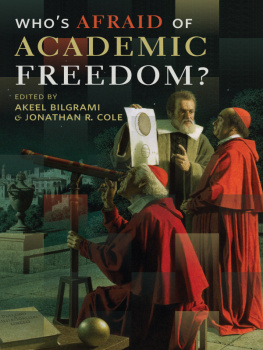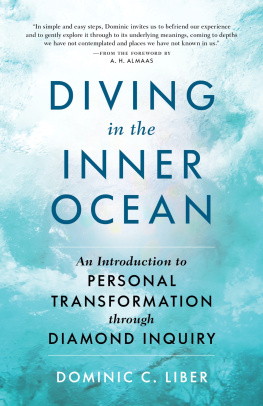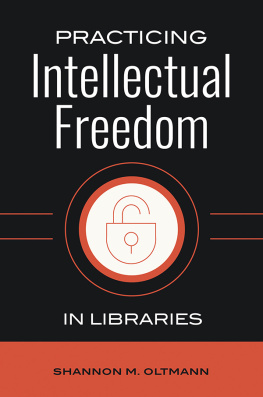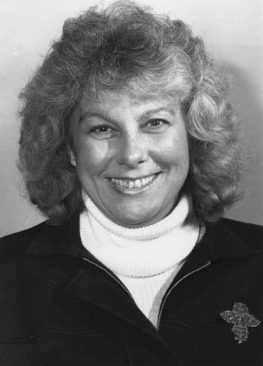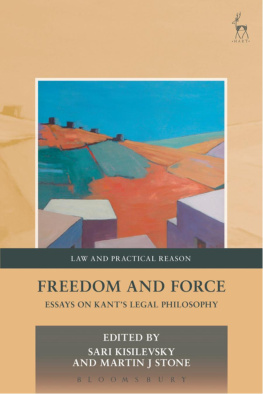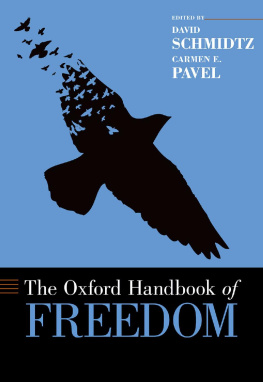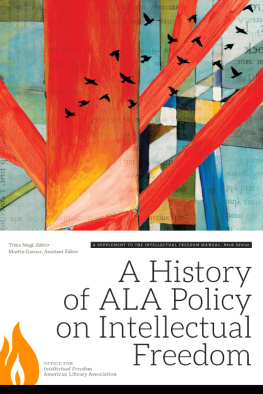WHOS AFRAID OF
ACADEMIC
FREEDOM?
WHOS AFRAID OF
ACADEMIC
FREEDOM?
EDITED BY
AKEEL BILGRAMI
& JONATHAN R. COLE
COLUMBIA UNIVERSITY PRESS
NEW YORK
Columbia University Press
Publishers Since 1893
New York Chichester, West Sussex
cup.columbia.edu
Copyright 2015 Columbia University Press
All rights reserved
E-ISBN 978-0-231-53879-4
Library of Congress Cataloging-in-Publication Data
Whos afraid of academic freedom? / edited by Akeel Bilgrami and Jonathan R. Cole.
pages cm
Includes bibliographical references and index.
ISBN 978-0-231-16880-9 (cloth : alk. paper)
1. Academic freedomUnited States. 2. Academic freedomMoral and ethical aspectsUnited States. 3. Teaching, Freedom ofUnited States. I. Bilgrami, Akeel, 1950 II. Cole, Jonathan.
LC72.2.W48 2015
378.1'213dc23
2014014722
A Columbia University Press E-book.
CUP would be pleased to hear about your reading experience with this e-book at .
Jacket Design: Jordan Wannemacher
Jacket Image: National Geographic Creative/Bridgeman Images
References to websites (URLs) were accurate at the time of writing. Neither the author nor Columbia University Press is responsible for URLs that may have expired or changed since the manuscript was prepared.
For those, past and present, who have suffered because of the absence of free inquiry.
CONTENTS
AKEEL BILGRAMI AND JONATHAN R. COLE
GEOFFREY R. STONE
AKEEL BILGRAMI
DAVID BROMWICH
JONATHAN R. COLE
JOAN W. SCOTT
JON ELSTER
MICHELE MOODY-ADAMS
ROBERT POST
PHILIP HAMBURGER
RICHARD A. SHWEDER
ROBERT J. ZIMMER
MATTHEW GOLDSTEIN AND FREDERICK SCHAFFER
STANLEY FISH
JUDITH BUTLER
JOHN MEARSHEIMER
NOAM CHOMSKY
JONATHAN R. COLE, STEPHEN COLE, AND CHRISTOPHER C. WEISS
T HE TITLE OF this volume, despite its associative distractions, is meant quite literally. A primary achievement of the essays in the pages that follow is to identify and analyze different groups and tendencies in our society that fear academic freedom and attempt to thwart it, sources as diverse in range and generality as intellectual orthodoxy, intellectual obscurantism, the interests of donors, institutional review board licensing, Israeli and other pressure groups, U.S. legislation and government policy, and actions taken within universities such as speech codes and restrictions on research
As a value within the academy, it is arguable that freedom of inquiry is unique and may be given a lexicographical priority over other values because it is an enabling value. It enables the pursuit of other values and, therefore, it cannot be weighed on the same scale as the values it enables, whether these be truth in the outcome of inquiry, or more generally excellence in the pursuit of inquiry, or simply the peace of mind of inquirers We have said it is arguable that this is so. It cannot complacently be assumed to be so. Some of the essays in the volume try to provide the arguments by which it may be established, addressing considerations that are sometimes raised to question this priority of academic freedom, considerations that appeal to the very values that it claims to enable.
Such lexicographical priority is, of course, often granted to freedom of speech and discussion outside the academy as well, so much so that it is enshrined as a familiar and fundamental law of the land. There are essays here that wrestle with the question: Is academic freedom just a name for the practice, within universities, of the political freedom guaranteed by the U.S. Constitution, or is it, for reasons having to do with the specific nature of the academy, set apart from that more general freedom?
That question needs to be considered in conceptual and analytic terms, but also historically. One of the curious features of the value of academic freedom is how little it has evolved since the American Association of University Professors (AAUP) first articulated the value in its formal statement in 1915, which was reinforced and somewhat expanded in 1940. The value has not evolved over time the way the interpretation and scope of the First Amendment has. While there have been essays and books written about academic freedom since 1940, it may well be time for a more detailed and considered articulation of what exactly academic freedom protects and what it does notand whether we should reconsider its original intent, which was (as Robert Post has claimed in a number of essays) that academic freedom is distinguishable from First Amendment rights and has more to do with the contract that exists between faculty members and others, including trustees, academic administrators, and outside authorities. Some essays here make an attempt to give some historical grounding to this issue, while others dispute it by showing its extreme restrictiveness.
Though questions of academic freedom affect all of society and not just the society of scholars, though its fruits are reaped by everyone and by most institutions, a specific group that is most affected by its presence or absence is the faculty in universities with their special duties of teaching and research. With this in mind, the editors decided to carry out an empirical pilot survey of Columbia University full-time faculty opinion on a wide variety of questions revolving around the academic freedom they enjoy and expect but which is sometimes under question and threat. The survey is presented here with an analysis by Jonathan R. Cole and his collaborators. One question that is derived from the results of the survey relates to the hierarchy of values in a university: Is academic freedom seen by the faculty as a special enabling value, or is it considered by most contemporary faculty members as one among a set of contenders for priority? The fourteen vignettes contained in the empirical study, which in some cases asked faculty members to choose among competing university values (one of which was always free inquiry or academic freedom, although that was never explicitly mentioned in the survey), suggest that most faculty view academic freedom as essentially freedom of speech. The survey also suggests an erosion of certain core values within the academy. Is academic freedom one of them, as apparently are values like disinterestedness (exemplified in, among other things, the normative prohibition against faculty members profiting from their discoveries)? The pilot study raises more questions than it answers, one of which is whether different major universities and colleges place different weights on these various values. It is fair to say that ever since John Coulter in a celebrated address stressed the value of Lehrfreiheit to the idea of the modern research university, followed several decades later by the equally and rightly celebrated Kalven committee report, the University of Chicago has been something of a pioneer in this country on the matter of the centrality that academic freedom came to have in higher education. A comparison of other universities with the University of Chicago on the question of freedom of inquiry may therefore be one way to assess these differential weights. Two essays here that focus on the University of Chicago may provide a start in helping to make such a comparative study possible.
Taken together, these essays powerfully convey how no freedom can be taken for granted even in the most well oiled of functioning formal democracies. It is in the nature of power to resist the possession and exercise of freedom by those over whom it exercises power. And power, as we also know, does not threaten freedom always by coercion or, to put it differently, the opposite of freedom is not necessarily always coercive

